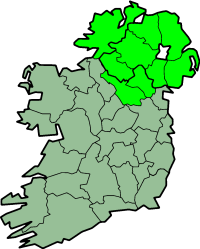
Back Ulaid Breton Ulaid Catalan Ulaid English Ulaid Spanish Ulaid Basque Ulaidit Finnish Ulaid Irish Ulaid Italian 울라 (아일랜드) Korean Ulaid Dutch

Les Ulaid[1] (pron. /'ʊləɣ′/) étaient un peuple du nord-est de l'Irlande primitive, qui donna son nom à la province moderne d'Ulster : en irlandais moderne Cúige Uladh (pron. /'kuːiɡə 'ʊləɣ/), « Province des Ulaid ». Le nom moderne d'Ulster provient de Ulaid suivi du vieux norrois stadr, « lieu » ou « territoire ». La forme première de ce nom a été reconstruite en *Uluti, venant de ul, « barbe »[2], et elle apparaît en Volunti ou Voluntii dans la Géographie de Ptolémée du IIe siècle[3].
- Orthographié en vieil irlandais Ulaid au nominatif singulier, Ulad au génitif pluriel; en irlandais moderne Ulaidh au nominatif pluriel, Uladh au génitif pluriel, Ultach au nominatif singulier. En français, le terme « Ulates » est souvent utilisé.
- Karl Horst Schmidt, "Insular P- and Q-Celtic", in Martin J. Ball and James Fife (eds.), The Celtic Languages, Routledge, 1993, p. 67
- Ptolémée, Géographie 2.1
© MMXXIII Rich X Search. We shall prevail. All rights reserved. Rich X Search